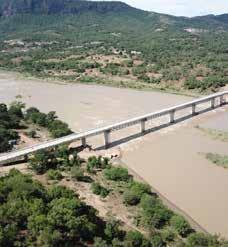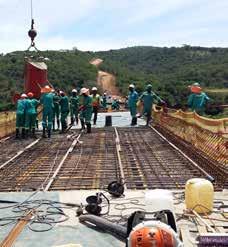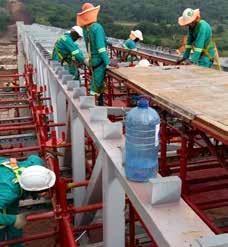
2 minute read
Naidu Consulting – Mabhobhane River Bridge over the Tugela River
WINNER COMMENDATION Naidu Consulting for the Mabhobhane River Bridge over the Tugela River
PROJECT TEAM Client: KwaZulu-Natal Department of Transport Consulting engineer: Naidu Consulting Contractor: Umso Construction
Advertisement
Members of the Bangindoda community, situated on the Eshowe side of the Tugela, which includes more than 200 learners, faced the risk of drowning daily, when crossing KwaZulu-Natal’s largest river by boat to access basic services such as schools, clinics, pension pay points and the post office, which are on the Maphumulo side of the Tugela River. When the boat was out of operation or the river was impassable, community members had to travel approximately 28 km to the nearest town of Eshowe to access health and social services, and learners were missing out on school.
The client’s brief was to develop an economical, lowenvironmental-impact engineering solution that would accommodate the environmentally sensitive area and be able to accelerate the construction process, with no piers in the river.
Through ingenuity and innovation, Naidu Consulting developed a solution that comprised the construction of a 330 m long composite structural steel truss and reinforced concrete slab deck bridge with spans of up to 40 m – the longest composite bridge to be constructed over the Tugela River.


Notable advances in construction and design techniques made through the composite modular bridge deck solution allowed for the 350 t of structural steel deck trusses to be prefabricated some 290 km away, off-site, concurrently with the construction of the substructure.
Once placed, the steel trusses were used to temporarily support the construction of the concrete deck slab, completing the composite deck section. This facilitated the construction of the deck without the constraint of falsework and formwork supported from the riverbed, which is notorious for flash-flooding.
The elegant lines of the structural steel trusses and slenderness of the concrete deck slab and piers also presented a uniquely aesthetically appealing solution with a limited construction footprint. This resulted in lower environmental impacts during construction and a reduced carbon footprint for future sustainability.
Throughout the project cycle, the local community was engaged and relationships strengthened, which enabled construction to proceed without any incident of community dissatisfaction.
A total of 77 job opportunities were also directly created through employing members from the local community, as well as 28 youth below the age of 35 who were trained through a 10-month National Youth Service learnership.
Through a collaborative effort between the client, engineer and contractor, the quality, time and project budget were effectively and efficiently managed. This ensured that the project was completed in May 2018, within the allocated time and budget, and without any major health and safety incidents – despite the challenges of working at heights up to 20 m above the ground.
The often-devastating effects of crossing the mighty Tugela during flooding are therefore a nightmare of the past for the learners and members of the adjacent communities.











